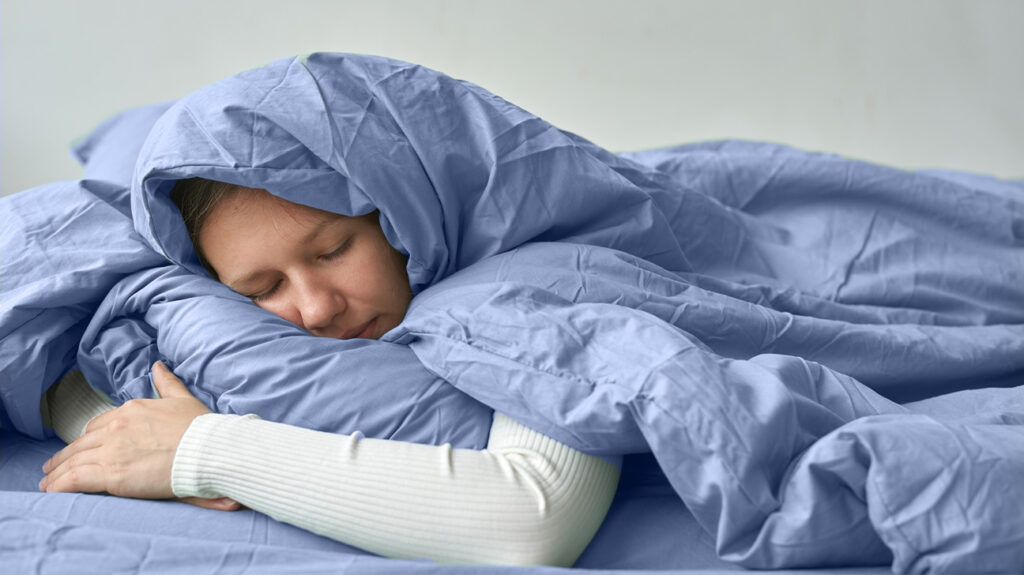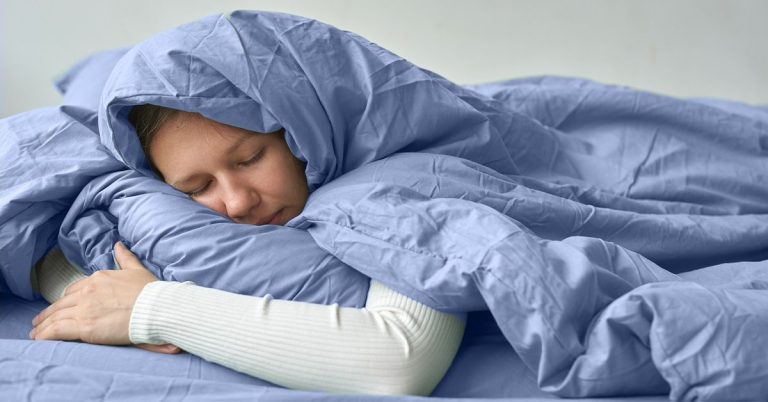
- Getting enough sleep is an important part of a person’s overall health.
- Poor sleep is a risk factor for cognitive problems such as memory loss.
- Researchers from Charité – Universitätsmedizin Berlin have clarified what happens during deep sleep – also known as slow-wave sleep – to promote the formation of memories in the brain.
- The study adds to evidence demonstrating the crucial role of sleep in memory consolidation and could help scientists develop preventive strategies against dementia.
“Depriving humans of sleep leads to all kinds of problems and can cause serious harm. » Franz Xaver Mittermaiermember of the scientific staff of the Institute of Neurophysiology of Charité – Universitätsmedizin Berlin in Germany, said Medical news today.
“It is fair to say that the organ that needs sleep the most is the brain. Sleep disconnects the brain from the outside world. The flow of sensory information is stopped. This allows past experiences to be replayed without “external interference” which is necessary to consolidate memories of these experiences, that is, to move them into long-term memory,” he said.
Mittermaier is the first author of a new study recently published in the journal
For this study, Mittermaier and his team used intact tissue samples from the
“The neocortex is the outermost part of the brain. Whenever we see an image of the brain, the surface we are looking at is the neocortex – the walnut-shaped surface. It is a structure that contains 16 billion neurons (electrically active brain cells). The neocortex is greatly enlarged in humans and plays a central role for the cognitive abilities that make us human: language, imagination, memory, emotion, etc.
— Franz Xaver Mittermaier
“In 2017, we started developing a platform where we collect brain samples from neurosurgeries that would otherwise be thrown away,” Mittermaier said. “We have managed to improve our methods to keep these tissue samples alive for more than 24 hours in physiological solutions. This allows us to study human brain cells and the connections between them (
“Once we had the opportunity to make these recordings, memory mechanisms were a very obvious topic to address. Professor Geiger and Henrik Alle — co-authors of the current study — had
At the end of the study, researchers discovered that slow electrical waves created in the brain during deep sleep help strengthen synaptic connections between neurons in the neocortex, making it more “receptive” to forming memories.
“During deep slow-wave sleep, when the sensory flow from the outside world stops, the neocortex displays very interesting activity consisting of HIGH and LOW states that alternate about once per second,” Mittermaier explained. “The UP and DOWN states result from synchronous changes in the electrical voltage of several thousand neurons in the neocortex.”
“We could show through our experiments that these sequences of UP and DOWN states actually adjust the synapses (i.e. connections) between brain cells and make them particularly strong when the neocortex switches from a DOWN state to a UP state,” he continued.
“The neocortex is put into a state of increased receptivity to information during this time window. If the seahorse “A region of the brain that stores short-term memories – returns a memory during this time window, this leads to more pronounced activation of neocortical brain cells, which in turn leads to transfer to long-term storage,” he declared. MNT.
“We are only beginning to scratch the surface of the mechanisms that are actually at play when the brain sleeps. Additionally, much of the research so far has focused on laboratory animals and not human tissue samples (as in our study). We have a lot of work to do to truly understand the sleeping human brain. Our study is just the beginning. Understanding the sleeping brain will help us combat disorders such as memory problems in older adults.
— Franz Xaver Mittermaier
MNT spoken with Verna Porter, MDboard-certified neurologist and director of the Dementia, Alzheimer’s Disease and Neurocognitive Disorders Study at the Pacific Neuroscience Institute at Providence Saint John’s Health Center in Santa Monica, California, who said the study was both exciting and stimulating because it highlights the crucial role of slow wave activity (SWA) during deep sleep in synaptic plasticity and memory consolidation.
“Of particular interest is SWA’s ability to strengthen synapses and stabilize memories at a precise cellular level,” Porter explained.
“For me, as a neurologist, this reinforces the critical importance of healthy sleep habits in maintaining cognitive function. Since patients with dementia often suffer from disrupted deep sleep, these findings highlight the need to better understand and treat sleep deficits in dementia care and prevention.
—Verna Porter, MD
“Next steps should focus on determining how SWA-induced synaptic mechanisms are altered in neurodegenerative diseases like Alzheimer’s and other forms of dementia. Longitudinal studies are needed to assess whether improving deep sleep can slow cognitive decline or improve memory retention in at-risk populations,” she continued.
MNT also spoke with Manisha Parulekar, MD, FACP, AGSF, CMDdirector of the Division of Geriatrics at Hackensack University Medical Center and co-director of the Center for Memory Loss and Brain Health at Hackensack University Medical Center in New Jersey, about this study.
“Deep sleep, particularly slow-wave sleep, plays a crucial role in memory consolidation – the process of stabilizing and strengthening newly acquired memories. This study highlights possible pathways of sleep on memory and describes a potential mechanism to help improve memory consolidation.
—Manisha Parulekar, MD, FACP, AGSF, CMD
“Dementia continues to pose a significant public health challenge. Studies suggest that the pathophysiology begins much earlier, 10 to 20 years before cognitive symptoms. The results could help identify possible preventive strategies and explore therapeutic approaches intended to support memory formation,” Parulekar said.
“A next step could be further studies exploring the impact of cognitive behavioral therapy for insomnia (CBT-I), mindfulness-based stress reduction, sleep hygiene education, light therapy and other non-invasive approaches on memory consolidation and its potential cognitive benefits,” she added.


